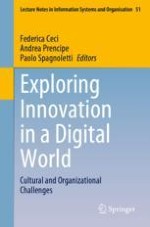Innovation is occurring at a rapid pace in digital work and demands increasing attention from academic scholars. In line with this demand, this book aims to provide an overview of recent advances in studies of innovation and technology in the digital space. The book addresses the cultural elements influencing the diffusion and adoption of digital technologies, the pervasive role of social media, the organizational challenges of digital transformations, and finally specific emerging technologies such as artificial intelligence and distributed ledger technology. The plurality of views offered makes this book particularly relevant to practitioners, academics, and policymakers, and provides an up-to-date view of the latest developments in Information Systems. It gathers a selection of the best papers (double-blind peer-reviewed) presented at the annual conference of the Italian AIS Chapter in October 2020 in Pescara, Italy.
